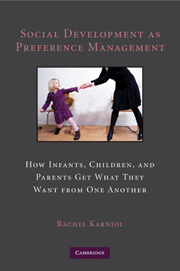 Social Development as Preference Management
Social Development as Preference Management Book contents
- Frontmatter
- Contents
- Acknowledgments
- Introduction
- 1 The Baby “Preference Game”
- 2 Children's Expression of Preferences
- 3 Emerging Meta-Preferences
- 4 Other People's Preferences
- 5 Parenting and Preference Management
- 6 Channeling Children's Preferences
- 7 Temporizing Preferences
- 8 Restricting Children's Preferences
- 9 Disciplining Noncompliance
- 10 Planes of Transformational Thought: Temporal, Imaginal, and Mental
- 11 Manipulating Others
- 12 Coping and Self-Regulating
- 13 Mind Play: Applying Transformational Thought
- 14 Minding One's Own Versus Others' Preferences: Altruism, Aggression, and Morality
- 15 Tying Up
- References
- Subject Index
- Name Index
5 - Parenting and Preference Management
Published online by Cambridge University Press: 05 June 2012
- Frontmatter
- Contents
- Acknowledgments
- Introduction
- 1 The Baby “Preference Game”
- 2 Children's Expression of Preferences
- 3 Emerging Meta-Preferences
- 4 Other People's Preferences
- 5 Parenting and Preference Management
- 6 Channeling Children's Preferences
- 7 Temporizing Preferences
- 8 Restricting Children's Preferences
- 9 Disciplining Noncompliance
- 10 Planes of Transformational Thought: Temporal, Imaginal, and Mental
- 11 Manipulating Others
- 12 Coping and Self-Regulating
- 13 Mind Play: Applying Transformational Thought
- 14 Minding One's Own Versus Others' Preferences: Altruism, Aggression, and Morality
- 15 Tying Up
- References
- Subject Index
- Name Index
Summary
‘… we should listen to children, follow what they want, and take their perspectives,’ Korean-American mother explaining the difficulty of raising children in the United States.
(Yang & Rettig, 2003, p. 362)Children's preferences are guided by socialization agents, primarily mothers, who have their own preferences regarding children's preferences. The crux of the problem of socialization is that whereas infants come into this world with the apparent assumption that all of their preferences will be satisfied by aligning reality to their preferences – and on demand – mothers are not neutral with respect to their infants’ preferences; they have an interest in their infants having certain preferences rather than others. They see the task of socialization as having children acquire those preferences that they want them to have. In this chapter, I discuss parenting in general, and outline approaches that have been used to account for the relationship among parenting, language use, and social class. In the following four chapters, I address the strategies of socialization themselves.
EXTERNAL PREFERENCES IN SOCIALIZATION
The philosopher Ronald Dworkin (1978) distinguishes between personal preferences and external preferences. A personal preference is a preference for a person's own enjoyment of goods or opportunities, whereas an external preference is his preference for the assignment of goods or opportunities to others. In other words, one's personal preferences are about what he himself would like to have or do, whereas his external preferences are about what other people should have or do. Viewed in this light, socialization reflects the interplay between children's personal preferences and parents’ external preferences for their children.
- Type
- Chapter
- Information
- Social Development as Preference ManagementHow Infants, Children, and Parents Get What They Want from One Another, pp. 89 - 106Publisher: Cambridge University PressPrint publication year: 2010


